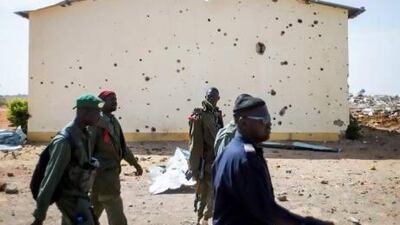BAMAKO // French and Malian forces pushed deep into northern Mali yesterday, capturing strategic positions in a dramatic expansion of their efforts to oust Islamist militants from the cities and desert wastelands they have controlled for months.
The French defence ministry confirmed that troops had taken control of the bridge at the city of Gao, which is a crucial route across the Niger river from the capital, Bamako, and of an airfield in the same city.
The energetic move forward, coming after the destruction on Friday of another key bridge by militants, could indicate that the French military may work with Malian forces to retake the northern cities of Gao, Kidal and Timbuktu without waiting for the support of African forces, now arriving piecemeal from other West African countries.
As France's intervention to halt the advance of extremist groups linked to Al Qaeda towards the capital enters its third week, the emphasis of the operation lies firmly with its well-trained and equipped soldiers.
French officials have insisted that the long-term mission to take and hold the three northern cities of Gao, Kidal and Timbuktu must be African-led. For now, they say, the Malians are in the lead, but they are due to be joined by thousands of troops drawn mainly from Mali's neighbours. They are seeking funding for a year-long operation, but the contingents from the various militaries are massing slowly.
Defence chiefs from members of the Economic Community of West African States met yesterday in the Ivory Coast to discuss how best to get the maximum number of soldiers on the ground as fast as possible. The Ivorian defence minister Paul Koffi Koffi said that 1,000 African troops out of a planned 4,500 were now in Mali. A western official in Bamako said that troops from neighbouring Burkina Faso had already taken up positions guarding a strategic bridge at the twon of Markala, on the road between the capital and the northern town of Niono.
But the same official, who discussed military issues on the condition of anonymity, conceded that the African forces lacked crucial skills in desert warfare. Some western countries including Britain are looking to train them to adapt to the new environment. A European Union mission to train Malian soldiers, which will focus on chain of command and accountability among other things, has sent a French general to Mali to assess the needs.
But such measures will take time, and with Malian officials confirming that militants attacked and destroyed a bridge near the border with Niger on Friday, the onus seems to be on French and Malian forces to act rapidly to retake the north. Thousands of French and Chadian troops are in Niger, poised to cross the border and enter Gao. The loss of the bridge dealt a blow to their strategy.
However, if the forces do enter the northern cities, cautioned the official in Bamako, it will be more difficult to avoid civilian casualties. Ground and air troops have already moved north to retake the small but strategic agricultural towns overrun by the three major militant groups - Ansar Edine, Al Qaeda in the Islamic Maghreb, and the Movement for Unity and Jihad in West Africa - on which their efforts have been concentrated thus far.
The militants typically use heavy machine guns installed on pickup trucks, which they position among houses in residential areas. Although officials insist French air strikes are precise and accurate, the mayor of Konna - the town whose occupation prompted the intervention - has said that 11 civilians died during the bombardment. Such numbers could be higher if planes and helicopters operate in a dense, urban environment.
There also remains the question of whether Mali is sufficiently politically stable to hold any gains in territory. Led by a weak president and group of military officers who seized power in a coup last year, Mali has been unable to receive international aid and cooperation due to its lack of a democratic government.
Bertrand Soret, of the European Union mission, said that the Malian council of ministers on Friday signed a road map to elections which has prompted the EU and other international actors to consider restarting badly needed development and aid projects in the country. With a war raging in the north, an election will not be possible "today", he said, though voter registration and development of mechanisms for a poll are under way. "Maybe before too long," he said.
afordham@thenational.ae
* With additional reporting from the Associated Press and Reuters

